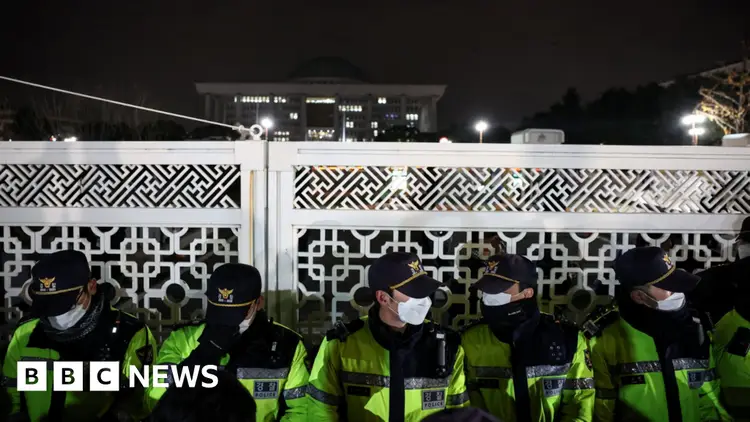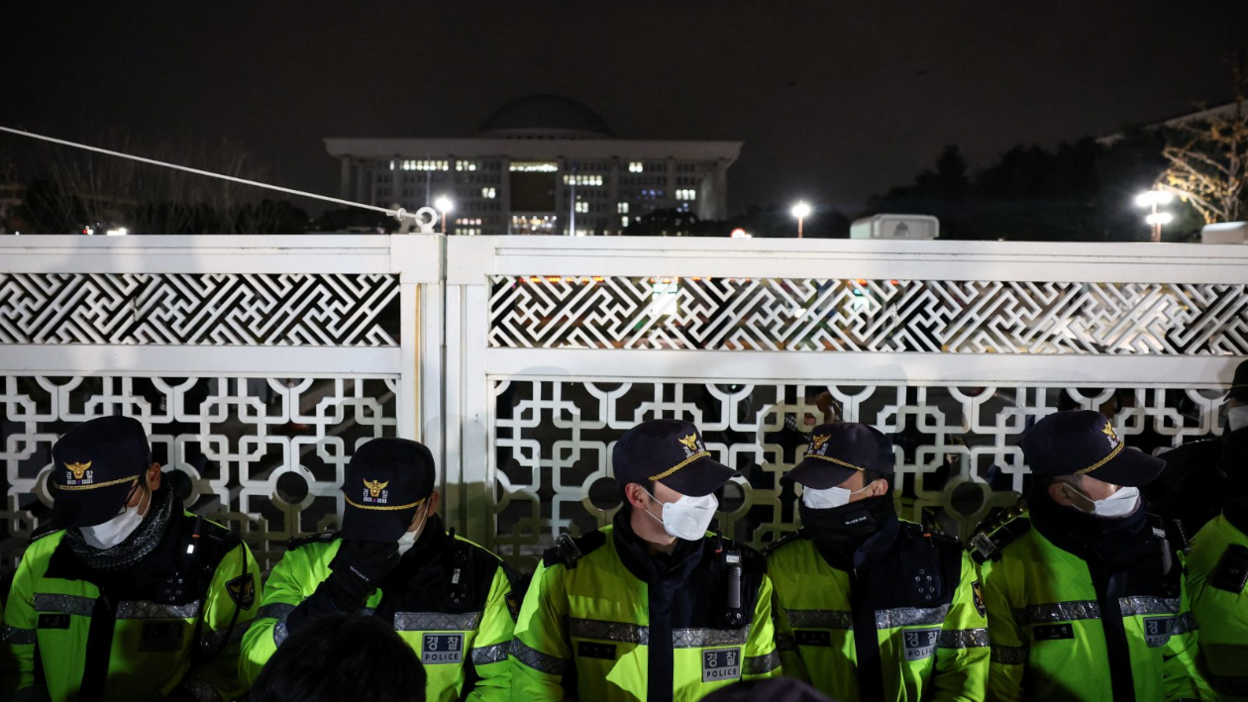Why has South Korea's president suddenly declared martial law?

Officers are stationed at the entrance of the National Assembly following the declaration of martial law by the president of South Korea.

Frances Mao and Jake Kwon
Amidst political tensions, South Korea's President Yoon Suk-yeol has imposed martial law in the nation for the first time in over five decades, leading to demonstrations near the parliament building.
The late-night announcement, broadcast on national television at 11 PM local time (2 PM GMT), prompted many citizens to speculate that it concerned North Korea—the South's nuclear-capable neighbor—or a serious national security issue such as a terrorist attack or coup.
It soon became evident that Yoon had taken this significant step in reaction to a sequence of political developments.
After losing control of parliament earlier this year, his government has been struggling against various opposition proposals and motions aimed at challenging his authority.
Political analysts suggest that he has reached a point where he may resort to declaring martial law—essentially military control over civilian governance—as a way to counteract political opposition, despite it being an undemocratic approach.
President Yoon Suk-yeol of South Korea
On Tuesday, opposition leaders quickly criticized the action as being against the constitution.
Lee Jae-myung, the leader of South Korea's primary opposition party, urged members of his Democratic Party to gather in parliament on Tuesday evening to oppose the declaration.
In Seoul, local news reports indicated that police buses had been deployed to obstruct or seal off the entrance to the parliament building.
Despite the circumstances, protesters quickly gathered outside the National Assembly, shouting "No martial law! No martial law" in opposition. They confronted groups of police officers stationed to protect the building.
What Is The Importance Of Martial Law?
Martial law refers to a short-term imposition of military control during a crisis when civilian government is considered ineffective.
The most recent announcement of martial law in South Korea occurred in 1979, following the assassination of a long-serving president during a coup.
It hasn't been used at all since South Korea transitioned to a parliamentary democracy in 1987.
However, on Tuesday, Yoon took decisive action during a national speech, stating that he was implementing military control in response to a threat posed by "anti-state forces."
When martial law is in effect, the military is granted increased authority, and standard legal protections and processes may be temporarily suspended.
Understanding The Political Landscape
Since the general election in April, where the opposition achieved a significant victory, Yoon has effectively become a powerless president in South Korea.
Since then, his administration has struggled to advance its own legislation and has instead found itself in the position of vetoing bills put forth by the opposition.
His popularity among voters has also taken a hit due to his involvement in various scandals related to political influence and corruption. One of these controversies involves the First Lady receiving a Dior handbag, while another pertains to accusations of stock manipulation.
Last month, he had to publicly apologize on national television, announcing that he would be establishing an office to manage the First Lady's responsibilities. However, he dismissed calls from opposition parties for a broader or independent investigation.
This week, the opposition put forward a plan to cut the government's budget. It's important to note that the president cannot veto a budget bill.
Meanwhile, the opposition took steps to initiate impeachment proceedings against members of the cabinet, including the leader of the government's audit agency, for not looking into the actions of the First Lady.
Yoon's announcement surprised a lot of people—things are changing quickly now.
The political opposition is urging the public to come together for a peaceful protest outside parliament. In South Korea, large demonstrations are a common sight and have a history of successfully influencing governmental change.
On Tuesday night, the leading opposition party, the Democratic Party, promptly urged all its members to gather at the National Assembly.
According to South Korean law, if most members of the National Assembly, which is the parliament, demand it through a vote, the government is required to end martial law. Additionally, this law makes it illegal for those in charge of martial law to arrest any lawmakers.
However, police buses had already been positioned in front of the building, acting as a blockade to prevent legislators from accessing the assembly.
There are also divisions within Yoon's own political party, the People’s Power Party.
According to South Korean news source Yonhap, the group's leader, Han Dong-hoon, has described the announcement of martial law as a "mistake." He has pledged to fight against the implementation of the law.

























































